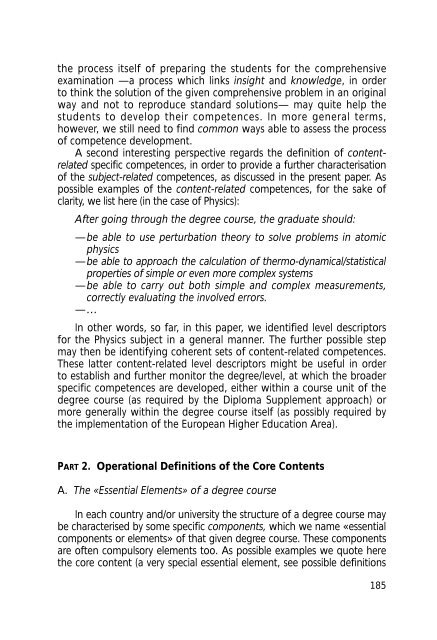Final Report Pilot Project - Relaciones Internacionales de la ...
Final Report Pilot Project - Relaciones Internacionales de la ...
Final Report Pilot Project - Relaciones Internacionales de la ...
You also want an ePaper? Increase the reach of your titles
YUMPU automatically turns print PDFs into web optimized ePapers that Google loves.
the process itself of preparing the stu<strong>de</strong>nts for the comprehensive<br />
examination —a process which links insight and knowledge, in or<strong>de</strong>r<br />
to think the solution of the given comprehensive problem in an original<br />
way and not to reproduce standard solutions— may quite help the<br />
stu<strong>de</strong>nts to <strong>de</strong>velop their competences. In more general terms,<br />
however, we still need to find common ways able to assess the process<br />
of competence <strong>de</strong>velopment.<br />
A second interesting perspective regards the <strong>de</strong>finition of contentre<strong>la</strong>ted<br />
specific competences, in or<strong>de</strong>r to provi<strong>de</strong> a further characterisation<br />
of the subject-re<strong>la</strong>ted competences, as discussed in the present paper. As<br />
possible examples of the content-re<strong>la</strong>ted competences, for the sake of<br />
c<strong>la</strong>rity, we list here (in the case of Physics):<br />
After going through the <strong>de</strong>gree course, the graduate should:<br />
—be able to use perturbation theory to solve problems in atomic<br />
physics<br />
—be able to approach the calcu<strong>la</strong>tion of thermo-dynamical/statistical<br />
properties of simple or even more complex systems<br />
—be able to carry out both simple and complex measurements,<br />
correctly evaluating the involved errors.<br />
—…<br />
In other words, so far, in this paper, we i<strong>de</strong>ntified level <strong>de</strong>scriptors<br />
for the Physics subject in a general manner. The further possible step<br />
may then be i<strong>de</strong>ntifying coherent sets of content-re<strong>la</strong>ted competences.<br />
These <strong>la</strong>tter content-re<strong>la</strong>ted level <strong>de</strong>scriptors might be useful in or<strong>de</strong>r<br />
to establish and further monitor the <strong>de</strong>gree/level, at which the broa<strong>de</strong>r<br />
specific competences are <strong>de</strong>veloped, either within a course unit of the<br />
<strong>de</strong>gree course (as required by the Diploma Supplement approach) or<br />
more generally within the <strong>de</strong>gree course itself (as possibly required by<br />
the implementation of the European Higher Education Area).<br />
PART 2. Operational Definitions of the Core Contents<br />
A. The «Essential Elements» of a <strong>de</strong>gree course<br />
In each country and/or university the structure of a <strong>de</strong>gree course may<br />
be characterised by some specific components, which we name «essential<br />
components or elements» of that given <strong>de</strong>gree course. These components<br />
are often compulsory elements too. As possible examples we quote here<br />
the core content (a very special essential element, see possible <strong>de</strong>finitions<br />
185


